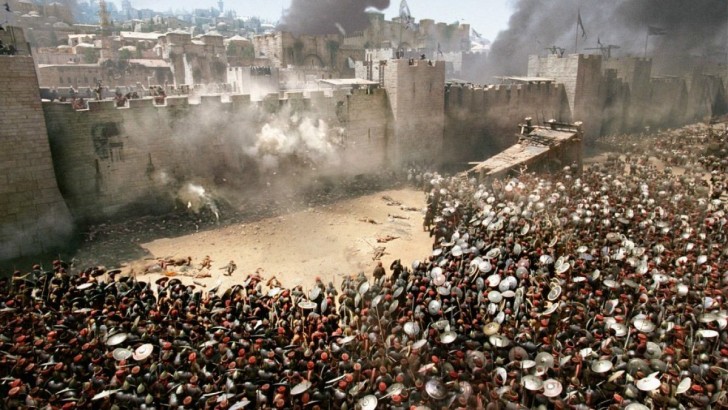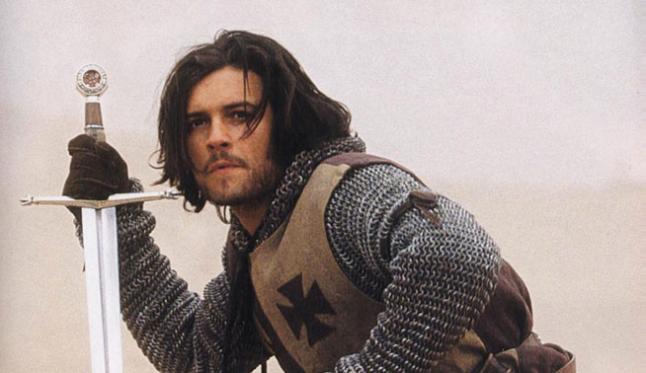Kingdom of Heaven (2005)
CAST: Orlando Bloom, Eva Green, Jeremy Irons, Marton Csokas, Brendan Gleeson, Liam Neeson, Ghassan Massoud, Alexander Siddig, David Thewlis, Michael Sheen, John Finch, Edward Norton
REVIEW:
In a number of his previous films, Ridley Scott has proven he knows how to make an epic. With its desert landscape and ancient setting, Kingdom of Heaven bears the closest resemblance to 2000’s Oscar-winning Gladiator, but in some ways is an even more technically ambitious production. Unfortunately, it’s a far less engaging motion picture.
We start in France in 1184. It has been over a century since Crusader armies from Europe seized Jerusalem, and one Knight, Godfrey (Liam Neeson), returns to his home village to find his son, whom we see is Balian (Orlando Bloom), a humble blacksmith mourning his wife’s suicide after the death of their child (even more so due to the belief that she has condemned her soul by taking her own life) and has never known his father. Their first encounter isn’t exactly warm, but Balian is soon drawn to Godfrey’s description as a place of salvation, both for his wife’s sins and his own. Father and son spend only a brief period of time together, however, before Godrey is mortally injured during an ambush in the forest. Before dying, he explains to his son that in Jerusalem they are trying to create a “better world”, open to all faiths, where all can live in harmony. After surviving a shipwreck, and an encounter with a young Muslim warrior, Nasser (Alexander Siddig), Balian finally makes his way to Jerusalem “at the end of the world”, where a tenuous but unbroken peace with the Muslims has been upheld between the famed Muslim war leader Saladin (Ghassan Massoud) and King Baldwin IV (Edward Norton, hidden behind a silver mask). Baldwin is a fair and just ruler, but he is dying of leprosy, raising the danger that he could be replaced by less benevolent forces who do not share his willingness to co-exist with Muslims, chiefly Guy de Lusignan (Marton Csokas) and his ally Reynald (Brendan Gleeson), who lust for power and war. To further complicate matters, Guy is married to Baldwin’s sister Sibylla (Eva Green), who soon falls into bed with Balian. But Guy and Reynald’s warmongering is about to shatter the peace between Christians and Muslims and embroil the Holy Land in a conflict which the walls of Jerusalem will not be able to withstand.
 This all sounds like a more epic story than it turns out to be. Maybe it’s just poorly-handled. Or maybe the filmmakers bit off more than they knew how to chew. It’s a little curious and more than a little disappointing that Ridley Scott seems to have forgotten some of what made Gladiator work. The battles in Kingdom of Heaven, while epically mounted and technically impressive, are also stupefyingly repetitive. Endless shots of columns of troops marching forward again and again, flaming arrows raining down on Jerusalem, swordfights, blood flying, it all looks impressive the first time, but not when repeated with little variation over and over. To make matters worse, character development is thin, and about two-thirds of the way through, any half-hearted attempt at it seems to be abandoned altogether and the filmmakers occupy the remaining screentime by throwing one identical battle scene after another at us. The result is that we’re bored not only because the battles all look the same, but because we haven’t grown to care about anyone.
This all sounds like a more epic story than it turns out to be. Maybe it’s just poorly-handled. Or maybe the filmmakers bit off more than they knew how to chew. It’s a little curious and more than a little disappointing that Ridley Scott seems to have forgotten some of what made Gladiator work. The battles in Kingdom of Heaven, while epically mounted and technically impressive, are also stupefyingly repetitive. Endless shots of columns of troops marching forward again and again, flaming arrows raining down on Jerusalem, swordfights, blood flying, it all looks impressive the first time, but not when repeated with little variation over and over. To make matters worse, character development is thin, and about two-thirds of the way through, any half-hearted attempt at it seems to be abandoned altogether and the filmmakers occupy the remaining screentime by throwing one identical battle scene after another at us. The result is that we’re bored not only because the battles all look the same, but because we haven’t grown to care about anyone.
Kingdom of Heaven begins promisingly. The first twenty minutes or so, until Balian arrives in Jerusalem, is engaging (perhaps not entirely coincidentally, also when Liam Neeson departs the movie). It’s when we get to the Holy City that the bottom falls out. Elements of the court intrigue are fleetingly interesting, but everything is half-baked (reportedly due to large sections of the film ending up on the cutting room floor). The romance between Balian and Sibylla is thinly-developed and uninteresting. Balian’s rivalry with Guy, built up as a major plot point, is completely abandoned halfway through. In fact, Guy and Reynald, after being built up as the villains, are pretty much cast aside after serving as catalysts for the outbreak of war, and to make things even more unsatisfying, Guy’s fate is left ambiguous, further evidencing a sloppy editing job. The blacksmith Balian is somehow suddenly a military tactician and skilled warrior, with the brief time he spends with Godfrey hardly accounting for his sudden abilities. After all the epic battle scenes, the movie drags itself to a ho-hum whimper of a conclusion.
 The cast includes some notable names, but every character is either one-dimensional or underdeveloped (or both). For Orlando Bloom, hot off The Lord of the Rings and Pirates of the Caribbean, this was touted as his meatiest dramatic role yet, but he’s clearly onhand more for his looks than his acting abilities. For the most part, his performance is adequate, but he lacks the necessary gravitas and fails to prove he’s more than a bland pretty boy. Equally dull is Eva Green, whose role falls victim to the truncated character development and choppy editing. There’s no spark between she and Bloom; they’re just two characters who suddenly fall in love because the script says so. Jeremy Irons brings a gruff authority to Tiberias, faithful servant of the King, but like everyone else’s, his role is underwritten. As our shallow villains, Marton Csokas preens and sneers and glares as the one-dimensional Guy, with Brendan Gleeson, who seems to show up on almost any battlefield from medieval Scotland to ancient Troy, as his partner in hammy mustache-twirling. Guy and Reynaud’s one-note shallowness is disappointing compared to how much time Gladiator spent on giving comparatively more substance to Joaquin Phoenix’s Commodus. Ghassan Massoud and Alexander Siddig bring nobility and dignity to their Muslim warriors Saladin and Nasser, but their screentime is limited. The two most vibrant characters are Liam Neeson, who brings his commanding presence to Godfrey even though he’s playing another martyred/expositional mentor he’s getting a little typecast as lately (The Phantom Menace, Gangs of New York, Batman Begins), and Edward Norton as the noble, philosophical King Baldwin, and one of them dies twenty minutes in, and the other is hidden behind a silver mask and is dead by the halfway point.
The cast includes some notable names, but every character is either one-dimensional or underdeveloped (or both). For Orlando Bloom, hot off The Lord of the Rings and Pirates of the Caribbean, this was touted as his meatiest dramatic role yet, but he’s clearly onhand more for his looks than his acting abilities. For the most part, his performance is adequate, but he lacks the necessary gravitas and fails to prove he’s more than a bland pretty boy. Equally dull is Eva Green, whose role falls victim to the truncated character development and choppy editing. There’s no spark between she and Bloom; they’re just two characters who suddenly fall in love because the script says so. Jeremy Irons brings a gruff authority to Tiberias, faithful servant of the King, but like everyone else’s, his role is underwritten. As our shallow villains, Marton Csokas preens and sneers and glares as the one-dimensional Guy, with Brendan Gleeson, who seems to show up on almost any battlefield from medieval Scotland to ancient Troy, as his partner in hammy mustache-twirling. Guy and Reynaud’s one-note shallowness is disappointing compared to how much time Gladiator spent on giving comparatively more substance to Joaquin Phoenix’s Commodus. Ghassan Massoud and Alexander Siddig bring nobility and dignity to their Muslim warriors Saladin and Nasser, but their screentime is limited. The two most vibrant characters are Liam Neeson, who brings his commanding presence to Godfrey even though he’s playing another martyred/expositional mentor he’s getting a little typecast as lately (The Phantom Menace, Gangs of New York, Batman Begins), and Edward Norton as the noble, philosophical King Baldwin, and one of them dies twenty minutes in, and the other is hidden behind a silver mask and is dead by the halfway point.
Kingdom of Heaven is not entirely devoid of interesting elements. Ridley Scott’s scorn for organized religion shines through in every priest character portrayed negatively as venal and sniveling, and the film depicts a bloody conflict without vilifying the “other side”. The Muslim general Saladin is a fearsome warrior but possesses a stern sense of honor. The battle sequences are epically mounted and technically well-crafted, even though their repetitive nature undermines their effectiveness. Harry Gregson-Williams provides a stirring and evocative musical score that captures an epic feel the rest of the production largely fails to deliver. But the film is poorly put together, a plodding unwieldy “epic” which lacks the focus or impact to justify a runtime which in the end feels not “epic” after all, but simply too long.
* * 1/2
